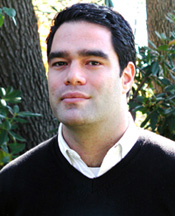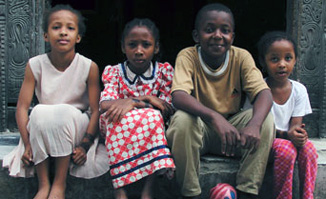Harvard global health entrepreneur Dr Jeffrey Blander works to improve Tanzanian health system
January - February, 2009 | Volume 8, Issue 1

Dr. Jeffrey Blander
Dr. Jeffrey Blander, a postdoctoral research fellow at Harvard and a participant in Fogarty’s Clinical Scholars program, is trying to use his research and business skills to alter traditional funding practices that may impede treatment of chronic health conditions in low-income countries.
Working on developing a standardized approach to strengthen health systems for chronic diseases, such as diabetes and high blood pressure, in Tanzania, Blander says traditional “vertically” funded programs to fight specific diseases may “inadvertently affect the overall delivery of care within a developing country.”
The reason, he says, is that where there are very limited resources, money flowing to high profile diseases diminishes the incentive for local clinicians to treat other, possibly more pressing, medical needs.
As part of his Fogarty project, Blander and colleagues from the Dar es Salaam region have interviewed more than 100 health professionals about priority health systems strengthening areas that include essential medicine procurement, human resources in health, patient referral practices, public-private partnerships, information systems and financial sustainability within the community.
His interest in systemic health care reforms stems from his work as a volunteer country director with the Clinton Foundation. Blander says his “A-ha” moment came after meeting the president of a small Caribbean country when he was pulled aside by a senior ministry of health official, telling him, “While HIV is very important and we are grateful for your support, can you also see what we can do about diabetes?”
“This brief conversation motivated me to seek out future opportunities to conduct operations research that examines the impact of health systems strengthening to integrate infectious and noncommunicable disease care,” Blander recalls.
The Fogarty presence in more than 100 countries, including many in sub-Saharan Africa, pays dividends for the United States, as well, he says. “Currently, the U.S. has more uninsured persons than the entire population of Tanzania.

Photo courtesy of World Bank
"Given the recent economic crisis, it is critically important to examine our own health care system to determine ways to reduce costs and improve access to care as well as make sure young physicians are not limited in the type of clinical practice they wish to pursue because of overwhelming student loan debt after graduation.”
“It has been a great privilege to be part of Fogarty and nothing less than what I consider my professional life's calling to work with colleagues in Tanzania and other resource-poor settings,” Blander says. “I strongly believe that global health is a driving force in shaping U.S. diplomacy and foreign policy."
Blander is currently a co-leader for the Technology Innovation Work Group for the Harvard Initiative for Global Health. He has taught for 10 years at the Health Science and Technology Division of Harvard University and MIT.
In the spring of 2008, he launched his second course on designing technology innovation for global health practice. He also founded a charitable organization dedicated to private health sector loan development and incubating medical technologies in resource-poor settings.
Blander holds a doctorate and two master’s degrees from Harvard, and an undergraduate degree in economics from the Wharton Business School at the University of Pennsylvania.
More Information
To view Adobe PDF files,
download current, free accessible plug-ins from Adobe's website.